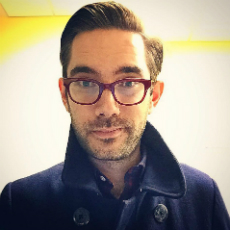 David Welch teaches writing in DePaul University's English Department, where he is also the Coordinator of Literacy Outreach and Managing Editor of Big Shoulders Books. David also manages the longstanding partnership between DePaul and One Book, One Chicago. David's writing has appeared in AGNI, Indiana Review, Subtropics, and other journals.
David Welch teaches writing in DePaul University's English Department, where he is also the Coordinator of Literacy Outreach and Managing Editor of Big Shoulders Books. David also manages the longstanding partnership between DePaul and One Book, One Chicago. David's writing has appeared in AGNI, Indiana Review, Subtropics, and other journals.
Chicago: The City That Gives
by David Welch
I’ve a friend whose favorite salutation is “Have a magical day.” When we first met, I was perhaps inordinately charmed by the phrase. I hadn’t heard it before, or at least hadn’t remembered it. And I certainly hadn’t received it when heading home after meeting for a coffee or burgers. At first it threw me even as it made its warm impression. I’ve never been much for magic. As a kid, fantasy novels and movies never held my interest (my particular poison was SciFi and, though it’s luckily become a less age-peculiar interest as I’ve grown older, political thrillers). And so it’s not surprising that the novelty—if not the pleasantries—of the phrase began to fade.
If I think about it, my earliest, cognizant association with the word must have been the Lovin’ Spoonful’s “Do You Believe In Magic” playing on “Oldies” 104.3 as my father and I drove around the south suburbs of Chicago. I don’t remember birthday party magic shows. I don’t remember trying to unlock the mysteries behind Houdini’s tricks—though perhaps my memory has only played a trick on me and—poof!—disappeared. Nonetheless, I do remember those car rides and what sparked my interest in music: my father would quiz me on the names of songs and the artists singing them as each new tune played on the radio.
It’d be cliché, of course—and too saccharine, too hyperbolic—, to say now that those days were magical. And yet the memories of them last. They made, to say it simply, an impression. That’s what magic does: it impresses. And to do so, it relies on what isn’t seen.
Each Fall term at DePaul University, I teach a course that allows students to fulfill their Experiential Learning requirement in the University’s Liberal Studies Program. There are a number of ways students can fulfill this requirement beyond completing “Experiential Learning” designated course work: internships, study abroad programs, and research, to name a few. Not all of them are about giving, not all of them require service. But service is—increasingly, to my mind—the way students fulfill their JYEL requirement when choosing to do so through coursework. And so I think a lot about “buy-in”—about how to spark students to invest in the process of giving.
Of course, no one can require that someone be actually selfless. But what we can do is offer the opportunity to, let’s say, step into the background, to move behind the scenes where so much true giving happens. This is true figuratively for almost every service opportunity I can think of. But it’s also literally true in any number of cases. Here I think from my own experience of the fieldtrips at 826CHI, the flagship program of which hinges, in large part, on a volunteer engaging with students from behind a wall while playing the character of the reclusive, allergic to children, and at all points astoundingly cranky Admiral Moody of A. Moody Publishing. No matter how much Admiral Moody coughs and sputters and snuffles and grumbles, without the Admiral being hidden, it wouldn’t work.
In the end, the truth of it all is that many of these students already have experience with volunteerism separate from their lives at DePaul, even if only through a similar requirement completed during high school. So some of the work is already done for me as students already view it as part of their studies, or even, in the best cases, as simply part of their lives. So they already expect it. They know what it means to give, or at its base what the experience is. That, like magic, its success so often hinges on what isn’t seen.


Add a comment to: Guest Blog: David Welch on Chicago: The City That Gives